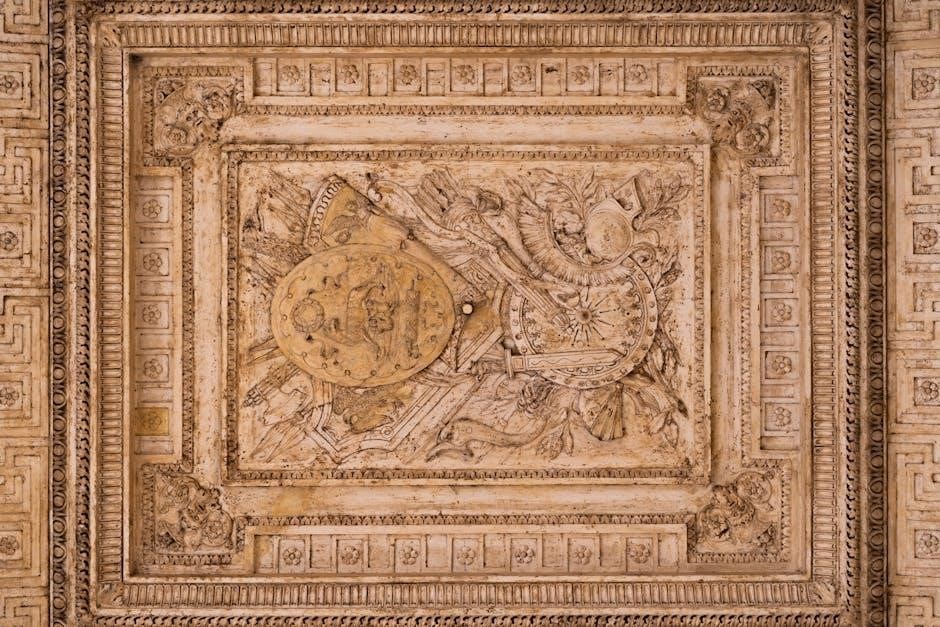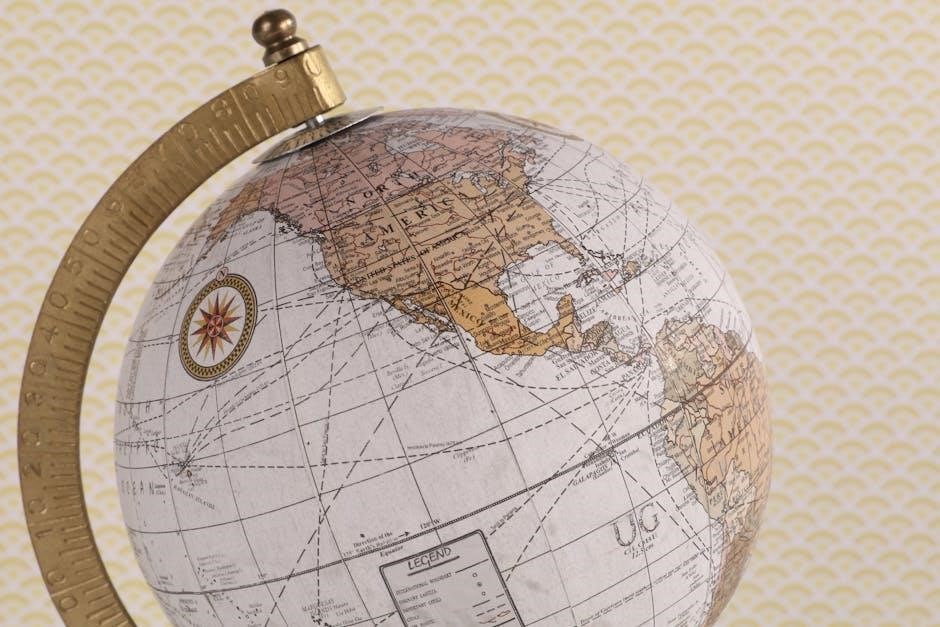World history multiple choice questions are an excellent resource for students and educators‚ offering a comprehensive way to assess knowledge of historical events‚ civilizations‚ and cultural interactions. They provide a structured approach to learning‚ enabling efficient revision and self-testing‚ while also helping to identify areas for further study and improvement.
Overview of World History MCQs
World history multiple choice questions (MCQs) provide a structured approach to understanding global historical events‚ civilizations‚ and cultural exchanges. These questions cover a wide range of topics‚ from ancient empires to modern global events‚ offering a comprehensive assessment of historical knowledge. MCQs are designed to test factual recall‚ analytical thinking‚ and the ability to interpret historical data. They often include options that address common misconceptions‚ helping learners identify and correct errors in their understanding; With a focus on clarity and precision‚ world history MCQs are invaluable for both self-study and classroom use‚ enabling users to evaluate their grasp of historical themes and patterns effectively.
Importance of Multiple Choice Questions in Studying History
Multiple choice questions (MCQs) play a vital role in studying history by providing a structured method for assessing knowledge retention and understanding. They help students identify gaps in their knowledge and focus on areas that require improvement. MCQs are particularly effective for covering vast historical periods and events‚ allowing learners to test their ability to recall facts‚ analyze causes and effects‚ and interpret historical data. Additionally‚ MCQs enable educators to evaluate student progress efficiently and provide immediate feedback. This format also fosters active learning‚ encouraging students to engage deeply with historical content and develop critical thinking skills essential for academic success.

Creating Effective World History MCQs
Effective MCQs require clear instructions‚ focused questions‚ and plausible distractors to test knowledge and critical thinking. They should cover key historical concepts and events comprehensively.
Best Practices for Designing MCQs
Designing effective MCQs involves clear question stems‚ accurate answer choices‚ and plausible distractors to ensure validity. Questions should test understanding‚ not just recall‚ and avoid ambiguity. Each MCQ should focus on a single concept or event‚ with distractors that are realistic but incorrect. Ensure the correct answer is unequivocal and aligns with the learning objective. Avoid using “all of the above” or negative phrasing unless necessary. Use concise language and avoid jargon unless it’s relevant to the topic. Regularly review and update questions to maintain relevance and accuracy‚ reflecting diverse historical perspectives and events. This ensures MCQs remain a valuable educational tool.
Common Pitfalls to Avoid in MCQ Creation
When designing MCQs‚ avoid unclear or ambiguous question stems‚ as they can confuse test-takers. Ensure answer choices are distinct and plausible‚ with only one correct option. Avoid using “all of the above” or “none of the above” excessively‚ as they can lead to confusion. Distractors should be realistic but incorrect‚ not obviously wrong. Steer clear of negative phrasing‚ such as “which of the following is NOT‚” as it complicates understanding. Additionally‚ avoid jargon or overly complex language unless essential. Ensure questions are culturally sensitive and free from bias. Regularly review MCQs for clarity and precision to maintain their effectiveness as an assessment tool.

Where to Find World History MCQ Resources
World history MCQ resources are widely available online‚ with free PDFs on educational websites‚ paid platforms offering structured study materials‚ and search engines like Google providing quick access.
Free Online Resources for World History PDFs
Free online resources for world history MCQs are abundant‚ offering convenient access to PDFs. Platforms like Google Scholar and educational websites provide downloadable materials. Search engines support specific queries using Boolean operators to refine results. Websites such as iAsk.Ai and News API offer structured resources‚ while forums like Stack Exchange host user-generated content. Many institutions share exam papers and study guides publicly. Using search terms like “world history MCQs PDF” or “site:edu multiple choice questions” yields relevant results. These resources are ideal for self-study‚ enabling learners to practice and refine their knowledge efficiently. They cover diverse time periods and regions‚ ensuring comprehensive preparation for exams or personal enrichment.
Paid Platforms and Study Materials
Paid platforms and study materials offer premium resources for world history MCQs in PDF format. Websites like Coursera and Udemy provide structured courses with downloadable materials. Platforms such as Kaplan and Barron’s specialize in test prep‚ offering comprehensive study guides. These resources often include expert-curated questions‚ detailed explanations‚ and practice exams. Paid materials ensure high-quality content tailored for exams like the AP World History or GRE. Many platforms also offer progress tracking and interactive tools. While free resources are helpful‚ paid options provide in-depth analysis and organized study plans‚ making them a valuable investment for serious learners seeking to master world history through MCQs.
Preparing for World History Exams Using MCQs
World history MCQs provide targeted practice‚ helping students identify knowledge gaps and improve retention. Regular use enhances exam readiness and time management skills effectively.
Strategies for Effective MCQ Practice
Effective MCQ practice involves active recall‚ spaced repetition‚ and focused goal-setting. Start by identifying weak areas and prioritize challenging questions. Use flashcards to reinforce key concepts and simulate exam conditions to improve time management. Regularly review explanations for incorrect answers to avoid repeating mistakes. Track progress to monitor improvement and adjust study plans accordingly. Incorporate group discussions to clarify doubts and gain diverse perspectives. Utilize world history MCQ PDFs for structured practice‚ ensuring comprehensive coverage of global events and cultural interactions. Consistent practice enhances critical thinking and problem-solving skills‚ fostering confidence for exams.
Time Management Tips for History Exams
Effective time management is crucial for success in history exams. Start by allocating specific study sessions with timers to simulate exam conditions. Skim through the entire paper first to identify easier questions and tackle them promptly. Allocate a fixed time per question to avoid overthinking. Skip complex questions initially and return to them later. Use world history MCQ PDFs for practice‚ focusing on completing the exam within the allotted time. Review your answers only if time permits. Regular practice with timed tests helps build speed and accuracy‚ ensuring optimal performance in actual exams;

Technology and World History MCQs
Technology enhances world history learning through interactive MCQ platforms‚ apps‚ and AI tools‚ making practice efficient and engaging for students worldwide.
Using Apps and Online Platforms for MCQ Practice
Apps and online platforms offer interactive and accessible ways to practice world history MCQs‚ providing students with flexible learning tools. Platforms like Kahoot!‚ Quizizz‚ and Quizlet allow users to create custom quizzes‚ track progress‚ and compete with peers. Many apps feature timed exercises‚ ensuring exam-like conditions‚ while others offer detailed explanations for incorrect answers. Additionally‚ AI-powered tools like iAsk and ChatGPT can generate tailored MCQs based on specific topics‚ enhancing focused study sessions. These digital resources are particularly useful for self-paced learning‚ enabling students to identify weak areas and improve retention of historical facts and concepts effectively.
AI and Search Engines in Finding Relevant Questions
AI-powered tools and search engines have revolutionized the way students and educators find relevant world history MCQs. Platforms like iAsk and ChatGPT enable users to generate tailored questions based on specific topics‚ ensuring focused study sessions. Advanced search engines allow natural language queries‚ making it easier to pinpoint historical events or themes. Additionally‚ AI can filter results from academic sources‚ ensuring accuracy and relevance. These technologies not only save time but also enhance the efficiency of exam preparation by providing targeted practice materials. By leveraging AI‚ users can access a wealth of MCQs‚ fostering a deeper understanding of world history and improving test performance.

Real-World Examples and Case Studies
Educators use world history MCQs to assess student understanding of key events‚ civilizations‚ and cultural interactions‚ providing practical examples to enhance learning and retention through structured assessment.
How Educators Use MCQs in Teaching History
Educators use world history multiple choice questions to assess student knowledge‚ promote critical thinking‚ and reinforce key concepts. These questions are often integrated into lectures‚ homework‚ and exams to gauge understanding of historical events‚ civilizations‚ and cultural interactions. Teachers also employ MCQs to encourage active learning through quizzes and group activities‚ fostering engagement and collaboration. Additionally‚ MCQs help identify knowledge gaps‚ allowing educators to tailor instruction and provide targeted support. By incorporating diverse question types‚ educators ensure a comprehensive approach to teaching history‚ making complex topics more accessible and fostering a deeper appreciation for global historical narratives.
Success Stories from Students and Teachers
Many students and educators have achieved significant success using world history multiple choice questions. These resources have proven instrumental in improving exam scores‚ enhancing retention of historical facts‚ and fostering critical thinking. Teachers report increased student engagement and better performance in standardized tests. For instance‚ students who regularly practiced with MCQs showed a 20-30% improvement in their understanding of complex historical events. Educators also appreciate the ability to track progress and identify areas needing additional focus. These tools have become a cornerstone in modern history education‚ empowering learners to excel and develop a deeper appreciation for global history.
World history multiple choice questions are a valuable tool for both students and educators‚ enhancing learning and assessment. They improve performance‚ engagement‚ and understanding of global events.
The Future of MCQs in History Education
The future of multiple choice questions in history education lies in their integration with technology and AI. AI-powered platforms can generate tailored MCQs‚ offering personalized learning experiences. Interactive tools like iAsk and advanced search engines will enhance accessibility and engagement. Educators can leverage these resources to create dynamic assessments‚ fostering critical thinking and deeper understanding of historical events. As technology evolves‚ MCQs will become more immersive‚ incorporating multimedia elements and real-time feedback. This blend of tradition and innovation ensures that MCQs remain a vital tool in history education‚ preparing students for a digitally driven future while preserving the essence of historical inquiry.